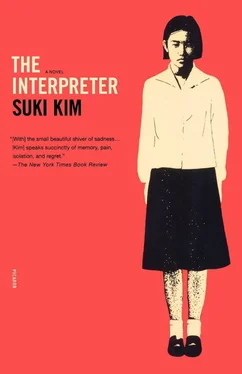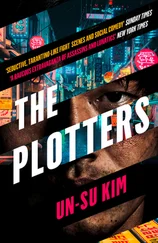Suki Kim - The Interpreter
Здесь есть возможность читать онлайн «Suki Kim - The Interpreter» весь текст электронной книги совершенно бесплатно (целиком полную версию без сокращений). В некоторых случаях можно слушать аудио, скачать через торрент в формате fb2 и присутствует краткое содержание. Город: New York, Год выпуска: 2011, ISBN: 2011, Издательство: Picador, Жанр: Детектив, Триллер, на английском языке. Описание произведения, (предисловие) а так же отзывы посетителей доступны на портале библиотеки ЛибКат.
- Название:The Interpreter
- Автор:
- Издательство:Picador
- Жанр:
- Год:2011
- Город:New York
- ISBN:0-312-42224-5
- Рейтинг книги:3 / 5. Голосов: 1
-
Избранное:Добавить в избранное
- Отзывы:
-
Ваша оценка:
- 60
- 1
- 2
- 3
- 4
- 5
The Interpreter: краткое содержание, описание и аннотация
Предлагаем к чтению аннотацию, описание, краткое содержание или предисловие (зависит от того, что написал сам автор книги «The Interpreter»). Если вы не нашли необходимую информацию о книге — напишите в комментариях, мы постараемся отыскать её.
The Interpreter — читать онлайн бесплатно полную книгу (весь текст) целиком
Ниже представлен текст книги, разбитый по страницам. Система сохранения места последней прочитанной страницы, позволяет с удобством читать онлайн бесплатно книгу «The Interpreter», без необходимости каждый раз заново искать на чём Вы остановились. Поставьте закладку, и сможете в любой момент перейти на страницу, на которой закончили чтение.
Интервал:
Закладка:
Even Suzy knew that many Korean fruit-and-vegetable stores crumbled in the early nineties. Especially after the Los Angeles riots of ’92, relations between Koreans and blacks were at their worst. Over eight hundred Korean stores were destroyed in South Central. Many were torched in Flatbush and Bedford-Stuyvesant. Back then, it was not unusual to find a circle of picketers outside a Korean market, which inevitably drove a store out of business. It was also around then that the Labor Department began cracking down on Korean markets for breaking minimum-wage laws or hiring illegal immigrants, which Suzy learned later through her interpreting. As one wisecracking lawyer put it, “Everyone feeds off the illegals until they get an urge to scratch.” Yet, from what she recalls, her parents had never suffered from the upheaval. They thrived, in fact, even bought a house during that time. How did they manage when so many others collapsed? The INS alone would not have guaranteed their lucky fortune. It is possible that the police might have had something to do with it. They could have left her parents alone, in exchange for the names of store owners guilty of breaking labor laws. It would not have taken much. A few names. A few handshakes. And how would the police have reacted when two of their snitches were found dead one morning in their South Bronx store? Would they have rushed to track down the murderer? Or would they have feared the exposure of their involvement? Why had the police been so quick to dismiss her parents’ murder as random? We didn’t ditch them cold, Detective Lester told her. Then why so eager now to pin the murder on those ex—KK members? The gang denied the killing. They insisted that her parents were already dead when they got to the store. Who had sent them there? Whose order were they following on that morning of November 1995?
“What about Mr. Lee of Grand Concourse? And Mr. Lim? I saw him after the last time I came here. He might’ve been following me. He certainly hated my father. What do you know about them? What did they have to do with any of this?” Suzy is surprised at her relentlessness. Leave the man alone, she thinks. Hasn’t he been through enough?
“I don’t know,” he says curtly. “I’m not like your parents. I don’t squeal on my fellow men.”
Of course not. Not many would side with the INS against their own people. Suzy lowers her eyes, suddenly stumped. It is then that she notices the full ashtray again. A black plastic ashtray, the kind that belongs in a bar rather than a home. She carefully picks it up and empties it in the garbage can underneath the table. Immediately she is struck by the haze of stale ashes, and a pang of disappointment. Nothing, the ashtray reveals nothing. Just a common circular shape. What did she expect?
“Have you heard of a bar called Seven Stars?” The question comes out abruptly. Useless—the man will tell her nothing more.
“Never heard of it.”
“And the Korean Killers? The gang that broke up almost ten years ago?”
“Like I said, I’m not like your parents,” he mumbles, avoiding her gaze. Yet, from the way his face tenses for a second, it is obvious that he is holding back something.
“No, of course not, you weren’t shot in cold blood.” She cannot help saying it, although she quickly regrets it, remembering his wife buried in Montauk.
“You think it was me who sent the KK to kill your parents?” he retorts sharply. “I don’t have that kind of money, and even if I had, I’m too old to get involved with a gang.”
So he is aware of the KK’s arrest. Who would have told him? Mr. Lee? Mr. Lim? Someone else? What was it that the mysterious caller had said?
They do not kill your parents… They watch you.
Was there more than one person behind it all? Was there a group of them who had hired the gang? Who are they ?
“Is that what you told them? When they came to you?” She is jumping the gun. But there is no other way. Nothing to lose.
“I told them it was a foolish idea,” he says wearily. “I told them they shouldn’t get the gang involved.”
So it is true. There was more than one. Many who’d been wronged by her parents, who might have plotted the murder together.
“Your parents had both the INS and the police behind them. They were basically invincible. Each time someone got deported, someone’s store got shut down, someone’s life savings got stolen, all anyone could do was just look on and hope that it wouldn’t happen to him next. Your parents left them no choice,” he says, staring vacantly at nowhere particular, as though he has reached the end of his defense. “Except the gang wasn’t supposed to kill…”
Maybe they didn’t. Maybe her parents were already dead by the time the KK arrived at the scene, just as the gang claimed.
“That’s as much as I know,” he says, stubbing out the cigarette. “I can’t give you their names. I won’t do that. Besides, I don’t know exactly who was involved. All I know is that some of them got together to come up with ways to stop your parents. The KK must’ve been their only option. You can get the police to question me if you want, but my answer won’t change. The police, the INS—they got all they could out of your parents anyway. They went after so many Korean stores for whatever violation they managed to squeeze from your parents. It’s all politics, white politics. The police will only be glad to wrap up the case now. How perfect that it should be the pack of Korean grocers getting rid of their snitch, who’d gotten past their usefulness! Koreans killing each other, it only proves their theory that immigrants are parasites.” Then he fixes her a long gaze and adds, “Whoever killed your parents were victims. They were desperate, even more desperate than me.”
So the end of the story.
So that’s how her parents came to their end, she tells herself. A bunch of Korean grocers who’d hired the three ex—KK members to threaten her parents, except their plan didn’t go as intended: the shots were fired inadvertently, such shots, such final shots. Except she is feeling no relief.
Nothing remains except for the smoke, thicker than the night. The air is hot, moist, stale. The rain outside, she can hear its knocking. Its relentless knocking. She wants to say something, anything that will ease the pain, for him, for herself. But there are no words. Instead, she glances at the photo once more. The unchanging face of the middle-aged woman who never had a child, who breathed her last breath somewhere in Montauk, whose cry still fills this room after thirteen years.
Suzy finally rises. She is afraid, suddenly terribly afraid of stepping outside.
“Take this,” he says, holding out an umbrella.
His loneliness is permanent, she realizes. That must be why she noticed him over a week ago at McDonald’s. Recognition among the same kind.
Avoiding his gaze, she says hesitantly, “When my sister came to you… how much did she know about our parents?”
He contemplates her for a while before saying, “Your sister—I’d never seen a young woman so haunted by grief.” Then he asks quietly, “Who do you think interpreted for your parents all those times with the INS?”
20.
FIRST IS THE HEAT. The unshakable heat inside her bones. The darkness is there as well. Then the wetness. The soaked sheets. The body curling into itself. The eyes are shut. The mouth is so stiff that she must be dying of thirst. Where’s the water? Is anyone there? Will anyone find her? Will anyone know if she disappears? The last thought frightens her. It is not death that makes her squirm, but a death with no witness, a death with no explanation.
Before her are the rolling hills. Each one appears so smooth that she wants to reach out and brush her fingers across its surface. She imagines plunging her body between the folds. She thinks if only she could get there she wouldn’t come back. She keeps wiggling her arms and feet. But the hills are far away, and she cannot reach them. Her body seems to be stuck to a gigantic futon, mixed in sticky breath. She tries to open her eyes, but the weight is impossible, as though a giant thumb is pressing on her eyelids. It is unclear how long she’s been lying here. Hours, even days.
Читать дальшеИнтервал:
Закладка:
Похожие книги на «The Interpreter»
Представляем Вашему вниманию похожие книги на «The Interpreter» списком для выбора. Мы отобрали схожую по названию и смыслу литературу в надежде предоставить читателям больше вариантов отыскать новые, интересные, ещё непрочитанные произведения.
Обсуждение, отзывы о книге «The Interpreter» и просто собственные мнения читателей. Оставьте ваши комментарии, напишите, что Вы думаете о произведении, его смысле или главных героях. Укажите что конкретно понравилось, а что нет, и почему Вы так считаете.












